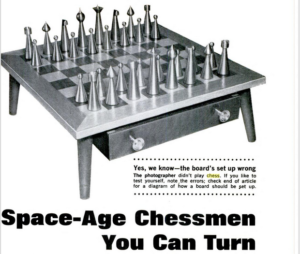Nothing is quite as unsettling to a scientist than his subject becoming self aware. Imagine the biologist that suddenly finds his fruit flies peering at him; the physicist who finds a very strange quark observing its observer; the mathematician whose pathological counterexample takes umbrage at that epithet. Or the chess blogger who finds his victims critiquing themselves. Just that happened to me when I was looking through old issues of Popular science. I suspect most of you might be familiar at least with its name, but for those few who aren’t: Popular science is a magazine dealing with — surprise, surprise! — popular science that has been published for well over a century. Look at this image from the December 1968 magazine:
Advertising in a large sans serif font that the chessmen can be turned seems a lot like damning them with faint praise,1 until you realise that they mean the turning of metal. Indeed, the next two pages of the magazine are dedicated to blueprints of all the pieces, so that a hobby metal worker can produce their own set. It’s not the greatest looking chess set ever, although it isn’t awful either.
Let’s have a look at the board. The pieces seem to be in the starting position, but the position is wrong in three different ways: h1 is a black square, the knights and bishops have switched places, and so have white’s king and queen. An impressive amount of failures! Now, let’s turn to the small print. “Yes, we know” it claims “– the board’s set up wrong”.2 And there you have it — my subjects have gained self-awareness! Later on, the article explains the correct way to set up the pieces.
This puts me in a slightly awkward spot. Do I give points for self-awareness? Do I penalise the stupidity of noticing an error and not correcting it? Do I just not care? That’ll be it!
But I do care about the unkept promise of space-ageness. Humph.
Realism: 0/5 As the starting position is illegal in three different ways, it is out, much like our subject from a couple of weeks ago.
Probable winner: Who knows? The game hasn’t started yet and since they don’t even know the starting position the players are probably not very strong, which also makes predictions hard.
1. [Or possibly something like this.] ↩
2. [Surely it should be wrongly, shouldn’t it? And there’s no period! Apparently it’s not just the position that’s wrong.] ↩
